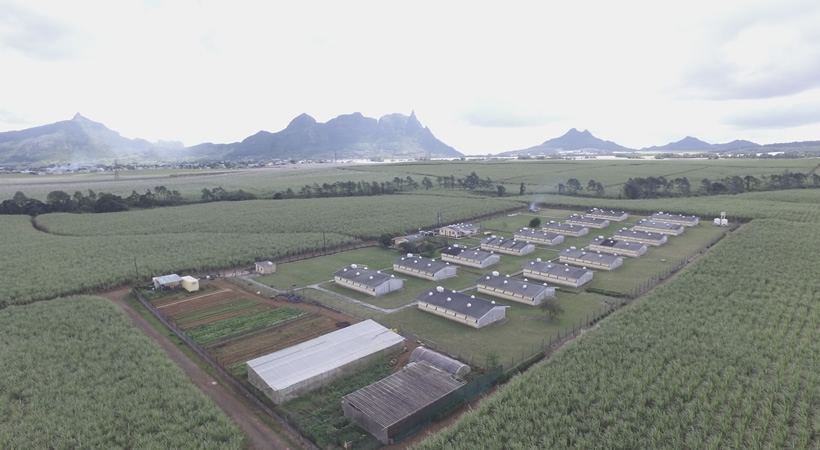Food & Allied Group takes an interest in the 2015 version of ISO 9001

In May 2016, Jean-Marie Reilhac, AFNOR’s quality and performance development manager, travelled to Mauritius to present the Food & Allied group’s executives with the benefits of the 2015 version of the ISO 9001 standard on quality management: processes, performance, risks, HLS… The audience was won over, including the head of the group’s advertising agency, who had previously been reticent about this type of tool.
Gérard Boullé, Chief Operating Officer, Gita-Anjali Bheenick, Head of Internal Audits, and Vincent Montocchio, Managing Director of Circus Advertising.
What role does quality play in Food & Allied’s quest for performance?
Gérard Boullé: First and foremost, customer satisfaction, through continuous improvement of our products and processes. This quest for quality has been present since the group’s inception. Indeed, founder Michel de Spéville was the first to introduce quality circles in Mauritius. And the first version of ISO 9001 was introduced on a voluntary basis back in 1994. However, we have never focused on certification as such. But it also provides us with the tools we need to satisfy our customers over the long term. Today, most of the Group’s companies are certified. And, until recently, only one or two executives were reluctant to do so…
Were you one of them?
Vincent Montocchio : To tell you the truth, ISO was a dirty word in our advertising agency for a very long time. We thought it was incompatible with creativity, the driving force behind our business. Today, I think exactly the opposite. As we grow in size and scope, our instinctive approach to quality has to give way to written procedures. They need to be formalized to avoid, for example, two account managers presenting two different prices for the same service… It was with this in mind that I agreed to attend the workshop on the 2015 version of the ISO standard presented by the AFNOR group. Three years ago, I wouldn’t have moved.
Under what circumstances were these two workshops organized?
Gita-Anjali Bheenick: The ISO 9001 (2008 version) audits revealed that the process approach had not yet been mastered by all the Group’s companies. Its acquisition only really got off the ground with the creation of AFNOR teams in Mauritius in 2013. Trainers and auditors came from all over France, bringing their skills, experience and quality of service to help us better understand this concept and its application. However, senior management was not yet really involved in the process. As chairperson of the ISO committee of the Mauritius National Bureau of Standards (MSB), I took part in drafting the 2015 versions of ISO 9001 and ISO 14001 (environment). I immediately understood that these two standards aligned with the Group’s business model, i.e. excellence in the quality of our products and services, the performance of our businesses and the satisfaction of our stakeholders. We organized these two workshops to raise awareness of this standard. The first with company directors and top management, the second with all Group quality managers. Since then, all companies have been asked to draw up a work plan with deadlines for adopting ISO 9001 version 2015.
What did you learn from it?
Gérard Boullé: In the past, ISO quality systems have sinned a little too much from a lack of communication. Jean-Marie Reilhac’s presentation was straightforward, concrete and in line with the company’s performance tools. So the process approach is in line with our preoccupation with cross-functionality and decompartmentalization, rather than operating in silos. The notion of performance, which was not mentioned in previous versions, has been fundamental to our Group for many years. Last but not least, the introduction of the HLS (High Level Structure) means even greater involvement of top management. This global approach, identical from one standard to the next, will avoid confusion by relying on a common base.
What was your experience of the workshop?
Vincent Montocchio: I heard the words I was waiting for. What used to frustrate me about quality standards was the huge focus on procedures, but not on end results. The new version of ISO 9001 takes much greater account of customer satisfaction. From now on, I think that if we at the agency manage to settle the problems of process and procedure thanks to this reference system, we’ll be able to devote ourselves fully to the heart of our business. That’s why I’m seriously considering embarking on this adventure. Circus has always been a bit of a contrarian and, to be honest, I also see communication potential in it. By becoming Africa’s first ISO 9001-certified advertising agency, we’ll be speaking the same language as our customers!
Reference
Food & Allied Group
Founded in 1966 by Michel de Spéville, Food & Allied is now run by his son Cédric de Spéville.
Head office: Moka, Mauritius.
18 companies
3,000 employees
Business sectors: agri-food, livestock, trade, business services, hotels, education and training, logistics.
The Group’s core business, raising table chickens, remains at the heart of its development.
Sales: 347 million euros in 2014, 9th largest company in the Indian Ocean.
Locations: Mauritius, Madagascar, Reunion Island, South Africa
Circus Advertising
Advertising and communications agency
65 employees
Sales: 4 million euros.
Head office: Moka, Mauritius.
Photo caption: The Food Allied group has several chicken farms located in isolated areas to ensure biosafety. Copyright Food Allied.